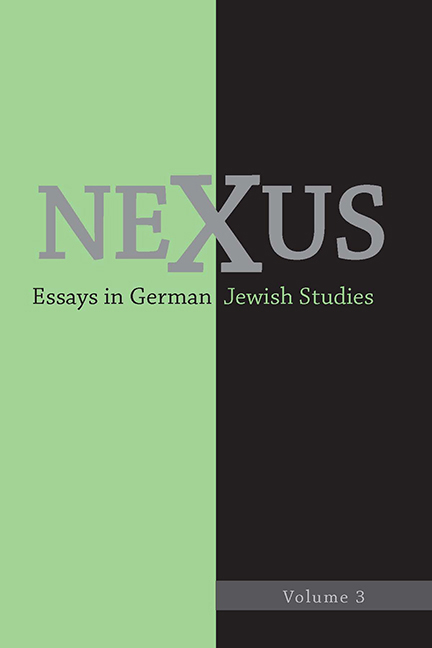Book contents
- Frontmatter
- Dedication
- Contents
- Acknowledgements
- Introduction
- “Ein weites Feld”: Ein Wort zu deutsch-jüdischen Studien anläβlich der Verleihung des ersten Egon Schwarz Prize for the Best Essay in German Jewish Studies
- “An Open Field”: A Word about German Jewish Studies on the Occasion of the Presentation of the first Egon Schwarz Prize for the Best Essay in German Jewish Studies
- Laudatio for Abigail Gillman's Prize-Winning Nexus Essay: “Martin Buber's Message to Postwar Germany”
- Heinrich Heine in Modern German History, by an Eyewitness
- Jeffrey Sammons, Heine, and Me: Some Autobiographical Reflections
- Heine's Disparate Legacies: A Response to Jeffrey Sammons
- My Debt to Heine and Sammons
- Die letzten Tage der Menschheit as a German-Jewish Tragicomedy, and the Challenge to Translators
- Edward Timms's “Die letzten Tage der Menschheit as a German-Jewish Tragicomedy and the Challenge to Translators”: A Response
- Kraus the Mouse? Kafka's Late Reading of Die Fackel and the Vagaries of Literary History
- The Parable of the Rings: Sigmund Freud Reads Lessing
- The Poetics of the Polis: Remarks on the Latency of the Literary in Hannah Arendt's Concept of Public Space
- The Marrano in Modernity: The Case of Karl Gutzkow
- German Jews Dogged by Destiny: Werewolves and Other Were-Canids in the Works of Heinrich Heine and Curt Siodmak
- Authenticity, Distance, and the East German Volksstück: Yiddish in Thomas Christoph Harlan's Ich Selbst und Kein Engel
“An Open Field”: A Word about German Jewish Studies on the Occasion of the Presentation of the first Egon Schwarz Prize for the Best Essay in German Jewish Studies
Published online by Cambridge University Press: 11 May 2017
- Frontmatter
- Dedication
- Contents
- Acknowledgements
- Introduction
- “Ein weites Feld”: Ein Wort zu deutsch-jüdischen Studien anläβlich der Verleihung des ersten Egon Schwarz Prize for the Best Essay in German Jewish Studies
- “An Open Field”: A Word about German Jewish Studies on the Occasion of the Presentation of the first Egon Schwarz Prize for the Best Essay in German Jewish Studies
- Laudatio for Abigail Gillman's Prize-Winning Nexus Essay: “Martin Buber's Message to Postwar Germany”
- Heinrich Heine in Modern German History, by an Eyewitness
- Jeffrey Sammons, Heine, and Me: Some Autobiographical Reflections
- Heine's Disparate Legacies: A Response to Jeffrey Sammons
- My Debt to Heine and Sammons
- Die letzten Tage der Menschheit as a German-Jewish Tragicomedy, and the Challenge to Translators
- Edward Timms's “Die letzten Tage der Menschheit as a German-Jewish Tragicomedy and the Challenge to Translators”: A Response
- Kraus the Mouse? Kafka's Late Reading of Die Fackel and the Vagaries of Literary History
- The Parable of the Rings: Sigmund Freud Reads Lessing
- The Poetics of the Polis: Remarks on the Latency of the Literary in Hannah Arendt's Concept of Public Space
- The Marrano in Modernity: The Case of Karl Gutzkow
- German Jews Dogged by Destiny: Werewolves and Other Were-Canids in the Works of Heinrich Heine and Curt Siodmak
- Authenticity, Distance, and the East German Volksstück: Yiddish in Thomas Christoph Harlan's Ich Selbst und Kein Engel
Summary
I WOULD LIKE TO THANK YOU for having founded a prize for German Jewish Studies. A prize such as this is surely a great rarity, if not the first ever in the world. With this you have legitimized and honored this field of study.
A special honor for me personally is that you have established this prize my name. For me this serves as great recognition of the contributions I have made to this field. I accept this tribute in the name of many others who would have equally well deserved it. I started in this field at most a little earlier than others. In the early 1960s I was a visiting Professor in Hamburg and it displeased me back then to see the lack of sincerity of many academics in dealing with the “newest,” history of Germany—its recent Nazi past. A challenge from the Hamburg Senate as to why exile research was not being conducted, was received by some colleagues with derision. I therefore turned to my publisher, Christian Wegner, with whom I had already written a book about Germany, and together we published a collection of texts about the refugees who fled Hitler in which everyday concerns of expatriates come up for discussion. This is how the bookVerbannung: Aufzeichnungen deutscher Schriftsteller im Exil(1964, Banishment: Reflections of German Authors in Exile) came into being, in fact one of the first of its kind on exile research. In my opinion, exile research and its twin sister German and Jewish studies is a vast open field in which a number of undiscovered plantlets are still sprouting.
Last but not least, I would like to congratulate the first award recipient, Abigail Gilman. I have read her essay about Martin Buber, or rather, someone read it to me aloud, and I learned a lot from it. It is probably not my job to say this, but, if I would have been one of the judges, I would have without a doubt cast my vote for this work.
In the context of German Jewish Studies, the term German, of course, refers to all German-speaking areas in the world.
- Type
- Chapter
- Information
- Nexus 3Essays in German Jewish Studies, pp. 11 - 16Publisher: Boydell & BrewerPrint publication year: 2017

